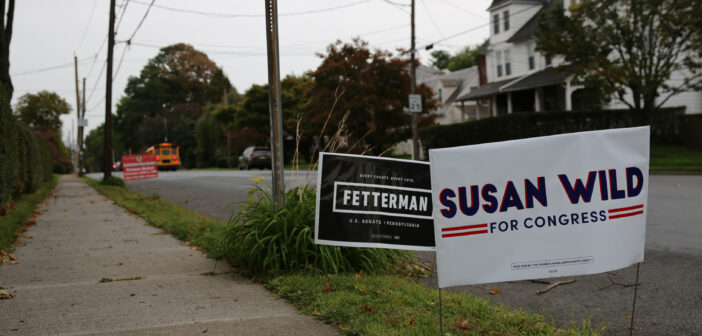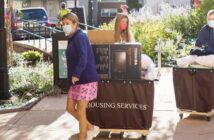In such a polarized world, an organization or individual may feel they need to hide their political views. A poll by The Cato Institute found over half of the people in the U.S. censor themselves out of fear.
Especially in classrooms that focus on political topics, some professors find this can affect teaching, dynamics between students and professors, and understanding of the world.
Assistant professor of anthropology Bruce Whitehouse said it is important that students understand their professors are still human, with their own opinions and biases — even when it comes to politics.
“We’re not entirely neutral,” Whitehouse said. “No human being is unbiased, in my view.”
He said it is important for students to know where their instructors stand politically on different issues, and that he is no exception.
Whitehouse explained he doesn’t want his students coming to class thinking, “this is what Professor Whitehouse wants us to think.” Instead, he said the strengths and weaknesses of different theories regarding the class topic should be discussed.
Arman Grigoryan is an international relations professor who specializes in the study of conflict. He said professors are individuals, unlike universities. Professors are held to an expectation of at least hiding their political views as much as possible, he said.
“(Professors) should not allow their political and ideological views to interfere with the educational process,” Grigoryan said. “They certainly should not punish students who ideologically disagree with them.”
International relations professor Mary Anne Madeira said students are receptive to their professors’s biases.
“There’s a distinction between policy discussions and partisan politics,” Madeira said. “I don’t want to shy away from talking about topics just because my students are going to impute some sort of partisan bias coming from me. We still need to talk about important policies.”
Each professor emphasized the significance of students continuing to have difficult conversations in the classroom and putting aside political beliefs for better understanding political theories, partisan values and how policy affects real people.
Whitehouse said, nevertheless, some students are shying away from debates in the classroom. This has manifested itself in students staying quiet in class and taking their opinions to social media.
With the Pennsylvania congressional elections coming up on Nov. 8, Whitehouse said there are negative impacts of this movement to online discourse.
“So much of our political discourse now is happening on social media, and people can feel like they’re politically engaged just by liking or sharing a post on social media,” Whitehouse said. “But unless you’re actually informing yourself about the candidates and submitting your ballot, I don’t know how much effect you’re having.”
Whitehouse also expressed concern that young people are losing the skill of disagreeing with people respectfully. Instead of identifying political opposites as evil enemies — or ignoring them — he said people with differing ideas should be able to learn from each other.
“We’re moving away from that,” Whitehouse said. “We’re diverging in the sense that people with differing ideas tend not to talk to each other so much anymore.”
Madeira said it can be difficult, from a professor’s perspective, getting students to hold these conversations in the classroom. She said no matter how the class is structured, students seem reluctant to discuss something vigorously with each other in a dynamic discussion.
Anthropology professor Allison Mickel said her values in the classroom have a basis of care and community-building when having challenging and robust discussions about what it means to live a good life and what a government owes to its citizens.
“Then we learn about how to build community in the world,” Mickel said. “To me, those are political but not partisan values: caring and reducing violence and injustice.”
To Mickel, sharing political opinions is more important than partisanship. However, she said in today’s political climate, people are grouped based on a single ideology and make inaccurate assumptions about each other.
“I wish students were more transparent and vocal and passionate about their political views,” Mickel said. “I wish students saw politics, not partisanship, as fundamental to the future that they want to build.”
Whitehouse and Madeira each commented on the ways in which people are receiving news from various different news sources, and how that is affecting political partisanship and polarization today.
Madeira said, more often than not, the news in the media tends to be low-quality. For the lack of sophisticated policy discussion in the media, she said teaching the basics about how public policies affect people is one of the most important things she, as an educator, can do in the classroom.
“If we’re talking about labor rights, I want my students to understand how free market reforms affect labor rights and how more government regulation affects labor rights,” Madeira said. “So we’re comparing and contrasting very opposite policies to evaluate them and then use those evaluations when we go to the voting booth in our own future.”
Grigoryan said a lack of debate using data and statistics fosters political competition with no merit to measure claims.
“It becomes a competition of who can shout louder, who has more political support and who has numbers on her side,” Grigoryan said.
Marietta Sisca, ‘23, is the vice president of College Republicans at Lehigh. She said it is difficult to gain a political following when the club is formally affiliated with a party.
“When most college students are liberal, apolitical or apathetic, publicly holding any kind of conservative stance seems almost unthinkable,” Sisca said.
As a member of the executive board for the club, she said she bears a partial responsibility to advocate for the club and to publicly air her personal beliefs, which she described as uncomfortable at times.
“I hold this position because I care deeply about the issues affecting our community and I’m not afraid to speak up when I notice problems with the way things are being run, but the climate on Lehigh’s campus can often be hostile,” Sisca said. “In a best-case scenario, it sparks a productive and respectful discussion, but in a worst-case scenario, there’s potential for backlash from strangers, losing friendships or being alienated from your program.”
In job applications and interviews, Sisca said she often spotlights her nonpartisan involvements and keeps details vague, only sharing her opinion on a need-to-know basis, accompanied with a prepared defense.
As a chemical engineering major with a minor in business, she said politics are often kept out of her classrooms. However, in a discussion about the COVID-19 vaccine, she explained there is a point when the discussion switches from how a technology works to how it should be legislated.
“As engineers, it’s important to consider the impact of our work, but these discussions happen rarely,” Sisca said. “We just run out of time in the curriculum.”
Sisca discussed the “silent majority,” who she described as people with strong opinions who keep them to themselves, fearing they can no longer “agree to disagree” anymore with the definition of political correctness changing everyday. As a result, Sisca said individuals with nuanced views on current political issues are having more one on one conversations.
Sisca communicated her frustration with Lehigh’s political representation regarding the “Life After Roe” panel.
“It seemed like nobody stopped to consider there might be students who would want to celebrate the Dobbs case,” Sisca said. “The school assumes that no one mourns the loss of the 1/5 of our generation lost to abortion. The one-sided publication is tiring, but this is not unusual on most college campuses.”
Whitehouse said different places, information and sources make it harder for liberals and conservatives to feel, at the end of the day, like they are working toward a similar mission.
Madeira acknowledged the power of the college experience in learning how political processes affect real people. To her, college classes provide a deeper understanding about difficult issues not provided in mainstream news.
“Even if students are fairly quiet and reluctant in my classroom, I just trust that they are still learning a lot that is going to make them better citizens when they leave Lehigh,” Madeira said.






Comment policy
Comments posted to The Brown and White website are reviewed by a moderator before being approved. Incendiary speech or harassing language, including comments targeted at individuals, may be deemed unacceptable and not published. Spam and other soliciting will also be declined.
The Brown and White also reserves the right to not publish entirely anonymous comments.
5 Comments
In most cases the students are simply biting their tongues knowing professor retributions from a 90% left wing faculty in the College of Arts & Crafts!!
You are a grown man constantly attacking the students on this campus that don’t agree with your ideas. It’s time to let go of the male dominated white opinion that you have and let lehigh grow. How could you possibly know? Aren’t you from the class where women couldn’t even join lehigh? What could you add to this conversation that is at all productive. Every time I see you in the comments you complain about lehigh and add nothing hrlpful to the conversation. If you care about lehigh, add something productive. Don’t just attack “liberal” opinions or ideas.
Actually Bruce, a lot of professors in the College of Arts and Sciences promote open dialogue. It’s up to the students to decide if they feel comfortable sharing or not, and if they bite their tongues maybe it’s because they know their opinion/beliefs aren’t the best ? Plus let’s not forget that the “College of Arts and Crafts”, as you put it, is home to majors like chemistry, physics, biology, and math which are most likely harder than whatever degree you used to run a hotel. So let’s use some critical thinking skills and rephrase your statement.
If the quoted comments are true the 90% liberal professors are being reasonable and fair. The comments to you indicate the backlash more than likely will be coming from fellow students.
“Sisca communicated her frustration with Lehigh’s political representation regarding the “Life After Roe” panel.
“It seemed like nobody stopped to consider there might be students who would want to celebrate the Dobbs case,” Sisca said. “The school assumes that no one mourns the loss of the 1/5 of our generation lost to abortion. The one-sided publication is tiring, but this is not unusual on most college campuses.” ”
Yes Virginia, there is hope for The Brown and White. This article is brimming with nuggets of gold and is what Journalism should be.